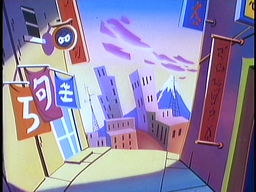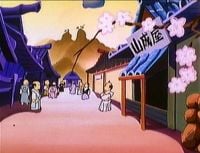Sayonara
| Sayonara | |
|---|---|

| |
| First appearance | "Mario Meets Koop-zilla" |
| Latest appearance | "Karate Koopa" |
| Capital | None |
| Ruler | None |
| Inhabitants | Ninjis, various Humans, Dr. T. Garden, Misaki |
It has been requested that this article be rewritten to have the history section removed for the following reason(s): No other history section is formatted like this, it's missing information on "Mario Meets Koop-zilla", and it has very little to do with Sayonara as a location. (tagged on June 20, 2024)
Sayonara is an oriental city featured in two episodes of The Super Mario Bros. Super Show!, "Mario Meets Koop-zilla" and "Karate Koopa". In the former, the city was a modern metropolis filled with large buildings, though the latter portrayal displayed an older feudal town. Many Ninjis are shown to reside in the older-looking incarnation of the town.
Sayonara is heavily based on the real-world country, Japan. Its name, Sayonara, is a Japanese translation for "goodbye", which describes how King Koopa destroys the entire location.
History
Karate Koopa's Attack
Some time after banishing Koop-zilla from Sayonara, Mario, Luigi, Princess Toadstool and Toad returned to the city to seek out Misaki, a martial arts expert whom they hoped would be able to defeat King Koopa and save the Mushroom Kingdom. However, the group was ambushed by Karate Koopa and his Ninji minions, and as a result, Princess Toadstool and Toad were captured.
Misaki soon found the group, and managed to at least rescue Mario and Luigi from the Ninjis. Misaki then proceeded to teach Mario and Luigi Plumb-Fu, and after enduring several trials, they were able to save Princess Toadstool and Toad. Mario also managed to scare Karate Koopa into escaping through a Warp Zone, driving him away from Sayonara once and for all.
Names in other languages
| Language | Name | Meaning | Notes |
|---|---|---|---|
| Chinese | Sayonara[1] | - | |
| Italian | Sayonara[?] | - |
